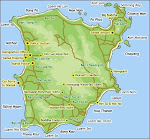In the West, shops display the price alongside their goods and that's the price we must pay if we want the item. This Western retail model has been emulated by Thailand's department stores and shopping malls and many other established shops, such as pharmacies, convenience stores and supermarkets. On Thailand's streets and markets, however, it is a very different story.
No bargaining here
In Thai markets, you're often buying right from the owner of the goods or one of his immediate family; an entrepreneurial unit operating a rental stall. Bargaining is expected, and the merchant is eager to close a sale while still making money.
This bargaining process may intimidate first-time visitors, with perhaps, memories of haggling over prices with a used-car dealer and coming away feeling burned. Don't worry; it's very different in Thailand. Here's what to do.
First, decide if bargaining is appropriate here:
- In an open-air market, with no prices posted, you bargain. In a department store with marked prices, you do not.
- If you're dealing with the owner, it's appropriate to bargain. If you're dealing with a salaried sales assistant, it's probably not so appropriate to try and drive a hard bargain. He or she will have a permissible discount limit of 10 - 15 percent. But this may be enough to make the wares attractive enough that you want to buy, especially for low ticket items.
- It should be worth everyone's while. Farangs (westerners) have been known to try to bargain over the price of a 10-baht (30-cent) bottle of water or 30-baht bowl of noodle soup. That’s bad form.
Once you've decided that you would like the item and determined that bargaining is expected, you need a sense of how much you can expect to drive down the price. You should also have an idea of how much you would be willing to pay. Make a counter-offer too low, and you look bad. Too high, and you'll pay more than you need to.
Typically, at an outdoor market you can expect to get the price down by 15-30 percent. However, if you’ve been pegged as a rich farang, a vendor might have raised the price by a factor of 2 or 3 times. Don’t buy the first thing you see. Look around. Get prices from a few merchants. You’ll soon get a sense of what’s reasonable. Only bargain for an item that you want. It's very bad form to wring major price concessions out of the vendor only to walk away.
Need sneakers? Go for it!
Some other tips:
- You'll do better if you learn the Thai language for the numbers needed to name a price.
- If you don't know Thai numbers, be alert to one potential confusion: The Thai-accented pronunciations of twenty and seventy — tsventy — are easily mistaken.
- It's never appropriate to get overly emotional about bargaining, nor to insult the merchandise or seller. Smile, don't raise your voice. Be respectful.
- Don’t let it become a point of pride to get the lowest possible price. This is business; perhaps it's a game to you; it's certainly not a war. Saving yourself a few bucks could make the difference as to whether the guy's family have just rice for supper, or something to go with it.
- If you make an offer and the merchant accepts it, the unwritten rules require that you make the purchase at that price. Same as Ebay — but Thailand had the system first.
















No comments:
Post a Comment